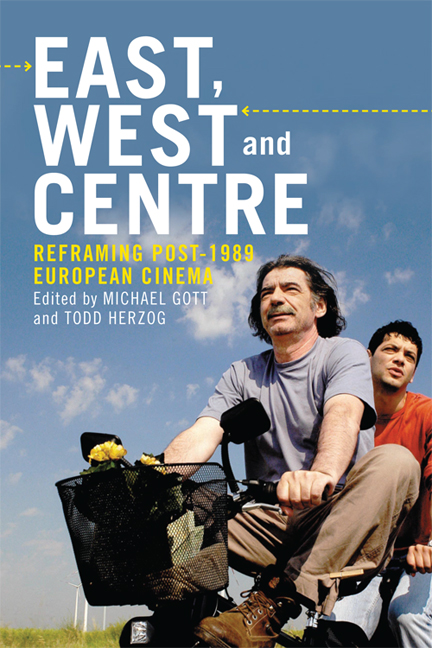Book contents
- Frontmatter
- Contents
- List of Figures
- Notes on Contributors
- Acknowledgements
- Introduction: East, West and Centre: ‘Mapping Post-1989 European Cinema’
- Part I Redrawing the Lines: De/Recentring Europe
- Part II Border Spaces, Eastern Margins and Eastern Markets: Belonging and the Road to/from Europe
- Part III Spectres of the East
- 14 Through the Lens of Black Humour: A Polish Adam in the Post-Wall World
- 15 East Germany Revisited, Reimagined, Repositioned: Representing the GDR in Dominik Graf's Der rote Kakadu (2005) and Christian Petzold's Barbara (2012)
- 16 Barluschke: Towards an East–West Schizo-history
- 17 The Limits of Nostalgia and (Trans)National Cinema in Cum mi-am petrecut sfârşitul lumii (2006)
- 18 The Ideal of Ararat: Friendship, Politics and National Origins in Robert Guédiguian's Le Voyage en Arménie
- Notes
- Bibliography
- Index
17 - The Limits of Nostalgia and (Trans)National Cinema in Cum mi-am petrecut sfârşitul lumii (2006)
from Part III - Spectres of the East
Published online by Cambridge University Press: 05 September 2016
- Frontmatter
- Contents
- List of Figures
- Notes on Contributors
- Acknowledgements
- Introduction: East, West and Centre: ‘Mapping Post-1989 European Cinema’
- Part I Redrawing the Lines: De/Recentring Europe
- Part II Border Spaces, Eastern Margins and Eastern Markets: Belonging and the Road to/from Europe
- Part III Spectres of the East
- 14 Through the Lens of Black Humour: A Polish Adam in the Post-Wall World
- 15 East Germany Revisited, Reimagined, Repositioned: Representing the GDR in Dominik Graf's Der rote Kakadu (2005) and Christian Petzold's Barbara (2012)
- 16 Barluschke: Towards an East–West Schizo-history
- 17 The Limits of Nostalgia and (Trans)National Cinema in Cum mi-am petrecut sfârşitul lumii (2006)
- 18 The Ideal of Ararat: Friendship, Politics and National Origins in Robert Guédiguian's Le Voyage en Arménie
- Notes
- Bibliography
- Index
Summary
There are several historical and practical reasons in the light of which Romanian cinema could be characterised as marginal. Unlike Poland, Czechoslovakia and Hungary, Romania did not develop a significant film school during the Cold War. During the 1990s only few and poor-quality films were produced and, today, there is no Romanian film industry in the sense of a commercially viable enterprise, and the country has only a few cinemas and small audiences. In this bleak landscape Cristi Puiu's film Marfa şi banii Stuff and Dough (2001) constituted a turning point for Romanian cinema as it ushered in what critics have called Romanian minimalism. Characterised by raw realism, dark humour, attention to detail, hand-held camera, location shooting, low-key performances and low budgets, Romanian minimalism has propelled recent Romanian films into the international limelight. Over the last decade and a half, Romanian films have received several prestigious prizes at reputable international film festivals, most prominently in Cannes and Berlin, and they have been celebrated as the breakout star of European cinema. Cătălin Mitulescu's feature film debut Cum mi-am petrecut sfarşitul lumii The Way I Spent the End of the World (2006) does not display the celebrated Romanian minimalist style. In terms of its production, the film is also not striking as it illustrates a widely spread trend in recent Romanian cinema towards international, particularly French–Romanian, collaborations. Uricaru states that the majority of contemporary Romanian films rely on financial support from abroad: France's policy to help foreign cinema has been particularly propitious for Romanian–French collaborations, as have been funds received competitively through the MEDIA (Measures to Encourage the Development of Audio Visual Industries) and the Eurimages programmes (Uricaru, 441–2). In this sense, The Way I Spent the End of the World is a Romanian–French co-production between Strada Film, the director's own production company, the Centrul Naţional al Cinematografiei (Romania's Centre for National Cinematography) and Les Films Pelleas (France), while the film also benefited from the support of the Sundance Institute (USA), from which Mitulescu received the award for best European script in 2005.
Mitulescu's film does, however, stand out among contemporary Romanian films owing to its unique narrative strategies. Thus, it distinctively blends humorous and dramatic focuses on life in Cold War Romania and on the revolution that brought about the demise of the country's Communist regime with a portrayal of the relationship between Eastern and Western Europe before and after 1989.
- Type
- Chapter
- Information
- East, West and CentreReframing post-1989 European Cinema, pp. 267 - 278Publisher: Edinburgh University PressPrint publication year: 2014



